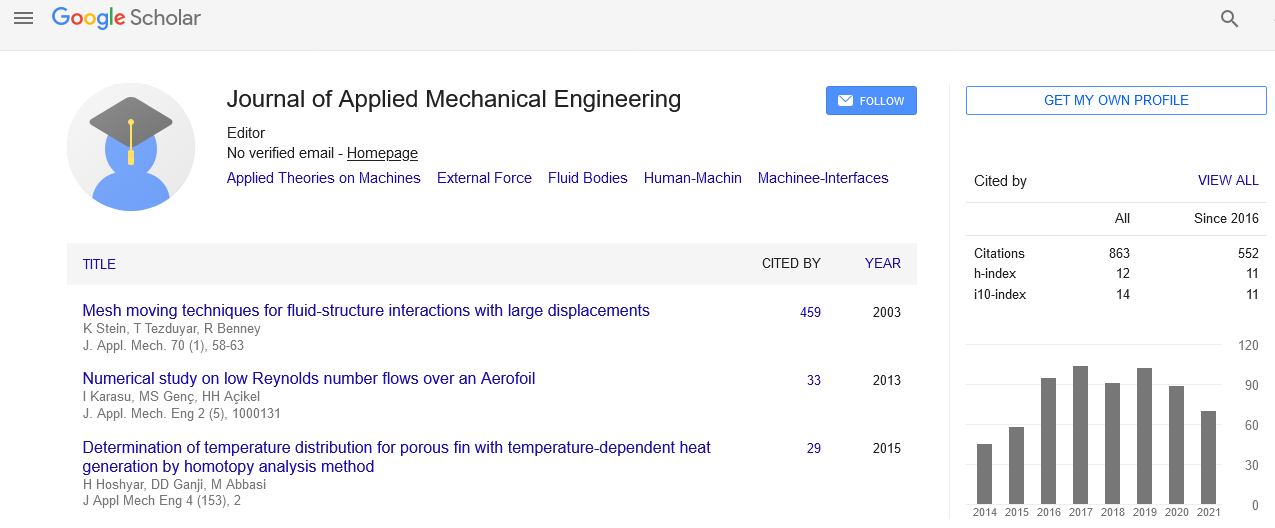Indexed In
- Genamics JournalSeek
- JournalTOCs
- CiteFactor
- RefSeek
- Hamdard University
- EBSCO A-Z
- OCLC- WorldCat
- Publons
- Google Scholar
Useful Links
Share This Page
Journal Flyer

Open Access Journals
- Agri and Aquaculture
- Biochemistry
- Bioinformatics & Systems Biology
- Business & Management
- Chemistry
- Clinical Sciences
- Engineering
- Food & Nutrition
- General Science
- Genetics & Molecular Biology
- Immunology & Microbiology
- Medical Sciences
- Neuroscience & Psychology
- Nursing & Health Care
- Pharmaceutical Sciences
Characterizing optical fiber for designing a new free-space fiber coil gyroscope
International Conference and Exhibition on Mechanical & Aerospace Engineering
September 30-October 02, 2013 Hilton San Antonio Airport, TX, USA
Yu-Lung Lo
Keynote: J Appl Mech Eng
Abstract:
This Polarization errors with small cross-couplings and signal-fading in the single-mode (SM) fiber coil in the depolarized gyroscopes are usually appeared in the depolarized gyroscopes. In order to solve the problems of polarization errors and signal-fading, a free-space unit matrix structure in the fiber coil designed by the Stokes parameter method is proposed to minimize the bias errors. The FOGs made use of the SM fiber can easily affected by the environment because of the temperature changes and internally or externally induced stresses such as fiber bending or twisting. The effects induced in the SM fiber coil may produce linear birefringence and circular birefringence. The birefringence appears as nonreciprocal phase shift which causes the signal-fading in the fiber coil. Thus, the SM fiber is characterized and analyzed by a decomposition method, and then the SM fiber can be compensated as a free-space media by a polarization controller. In the new structure of the FOG by using the concept of free-space unit matrix, we analyze the bias error in the fiber optic gyroscope with the effects from angles of misalignments and extinction-ratio in IOC. The result indicates that the new structure gives rise to lower the bias error in the FOG to about 10-4 ?/h with a 1000 m long SM fiber. The results show if the Jones matrix of the SM fiber coil is more close to the unit matrix, the bias error will be lower. As the authors? knowledge, this is the first idea using a free-space unit matrix structure in the SM fiber coil applied to fiber optic gyroscope.
Biography :
Yu-Lung Lo received his Ph.D. degree in Mechanical Engineering, University of Maryland, College Park, USA, in 1995. He has been faculty of the Mechanical Engineering Department, National Cheng Kung University, since 1996, where he is now a full professor and distinguished professor. Dr. Lo received the First-Class Research Award from NSC in 2005/2006, A-Class Research Award by NCKU in 2006, and the Dr. Ta-You Wu Award for Young Researchers from NSC in 2002. He was invited to be an invited speaker, keynote speaker, and plenary speaker in the international conferences. Currently, he is Chairman of Asian Society of Experiment Mechanics (ASEM). His research interests include experimental mechanics, fiber-optic sensors, optical techniques in precision measurements, and biophotonics. He has authored over 100 journal papers cited around 850 times in ISI/SCI web. Now he is member of Society of Experimental Mechanics (SEM).

